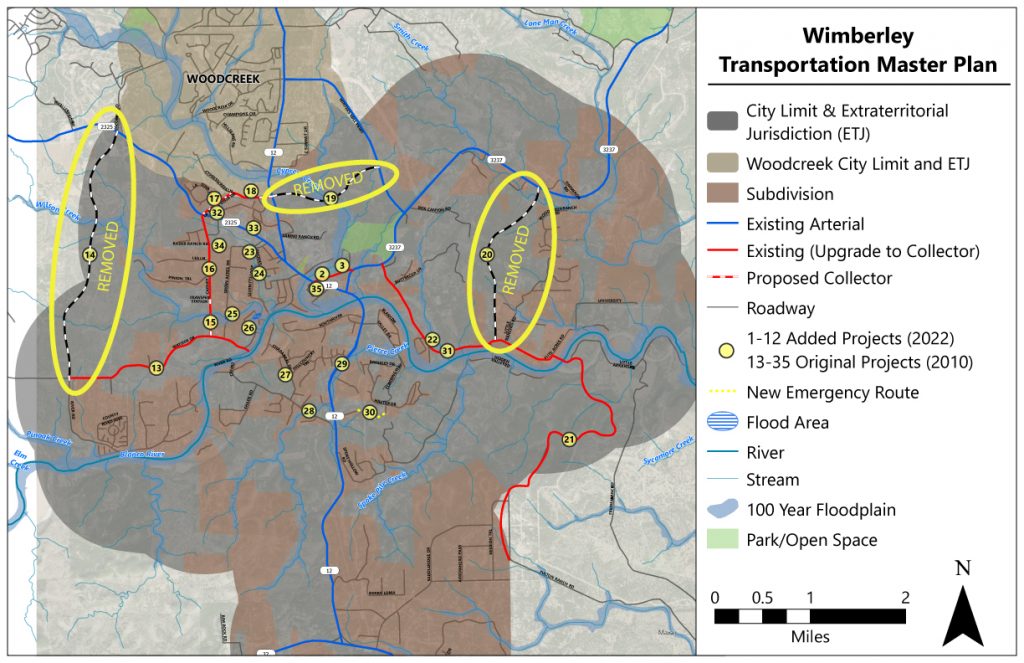At the December 1, 2022 meeting, the Wimberley City Council voted unanimously to approve the Transportation Plan with three roads removed. While the Transportation Plan was approved, Council Members expressed a clear intention that this was an interim Plan until a more comprehensive Land, Water, and Transportation planning process with a focus on stakeholder involvement can happen in the next year.
The roads removed from the Transportation Plan are shown as black and white dashed lines and circled in yellow in the map above. These three contentious roads were holdovers from the 2010 Transportation Plan that cross low-density, undeveloped areas. The River Road Extension (Project ID #14) would have crossed Wilson and Eaton Hollow Creeks through sensitive karst areas and parallels Heaton Hollow Rd. No increased density is predicted for this area that would warrant additional roads. The unnamed collector from Cypress Creek Lane to Winters Mill Parkway (Project ID #19), would have crossed Cypress Creek upstream of Blue Hole through undeveloped, sensitive karst terrain with several known springs. This route is unnecessary because Winter’s Mill Parkway already provides adequate access to bypass downtown areas. The unnamed collector from Flite Acres Rd to RM3237 (Project ID #20) would have run parallel to Little Ranches Rd, an existing road predominantly on undeveloped land with no subdivision.
The City’s Transportation Contractor explained that the Transportation Plan should reflect our community’s desired road network in the future. Several stakeholders, including Robin Gary and David Baker of the Watershed Association made public comment at the meeting. Dr. Noland Martin, a Conservation Biology Professor at Texas State University, pointed out that the 2010 Transportation Plan identified a need to incorporate environmental and water supply limitations and adjust roadway priorities when it was updated. Lori Olson, Environmental Planner and Land Conservation Expert, explained that roads are drivers for development and a Transportation Plan deserves careful planning to design a community within the limits of its natural resources. Heather Carter eloquently stated that all roads become water issues. David Baker, Executive Director of the Watershed Association, highlighted the fact that many of the proposed roads would encourage increased development in critical areas for groundwater recharge and that the groundwater supply can’t provide for more intense development–Jacob’s Well stopped flowing this year because of drought and existing groundwater pumping. Several landowners voiced objections to proposed roadways that cross their land without being consulted or informed. Robin Gary, Managing Director of the Watershed Association, suggested the City use stakeholder input to inform a comprehensive Land, Water, and Transportation Plan that balances the need for transportation and development planning with source water protection and conservation, and incorporate additional tools such as Hill Country Roadway standards and Traffic Impact Analysis into City ordinances.
City Council discussion expressed the need for planning tools to ensure developers contribute to transportation needs generated by new development. When cities have an approved Transporation Plan, subdivisions with lots less than 10 acres come under City review and staff can require developers to meet design standards established by the Transportation Plan, explained Nathan Glasier, City of Wimberley Development & Public Works Director. Mayor Pro Tem Minnick stated that certain components of the plan are problematic, however she thought the Council needed to pass a plan on Dec. 1 to get a more current plan than the one done in 2010.
Mayor Pro Tem Minnick proposed a motion to accept the Transportation Plan with the removal of 4 roads (which ultimately changed to only 3 after further discussion) with the idea that in the next year, the City work on a more comprehensive planning effort that weighs environmental sensitives, development, conservation, and water protection priorities with the community. Mayor Fulkerson pointed out that subdivision ordinances (for subdivisions with lots less than 10 acres) and traffic impact studies are preferred methods commonly suggested by organizations like the Hill Country Alliance and Watershed Association. Mayor Pro Tem Minnick suggested the need for long range planning with a strong stakeholder representation in the next year to review existing road conditions Ingress and egress, impact studies, and impact fees are tools the Council identified for subdivision rules. After discussion on the dais, the Minnick made the motion to approve the Transportation Plan with removal of 3 roads (14, 19, 20), the motion passed unanimously. All Council Members showed support for a Land, Water, and Transportation Plan developed with stakeholder input.
The Watershed Association commends the Mayor and Council for soliciting public input, listening to the many comments and concerns related to the Transporation Plan, and taking steps to plan for sustainable growth and source water protection. We look forward to future planning discussions and generating a Land, Water, and Transportation Plan for the Wimberley Valley.
Useful Links:
